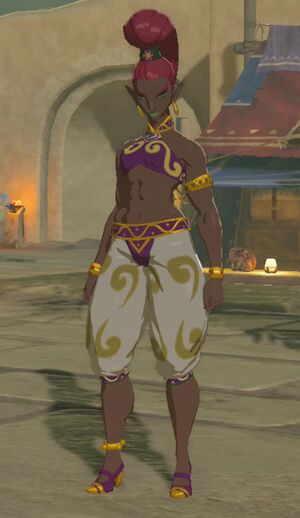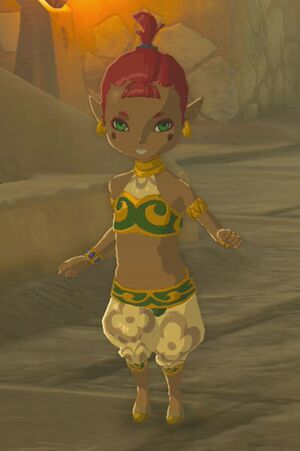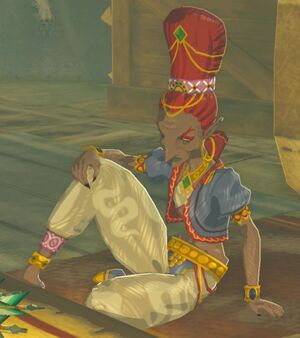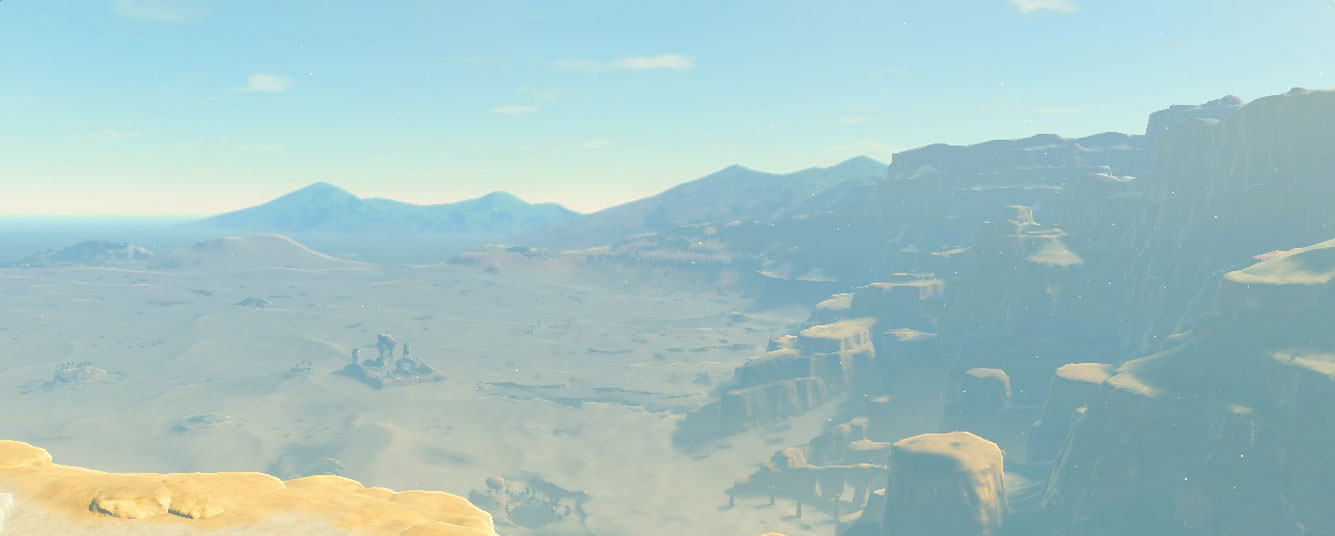Gerudo (Province): Difference between revisions
(→Race: Weapons should be its own section) |
|||
| Line 109: | Line 109: | ||
Gerudo young children exhibit paradoxical physiology compared to adults, presented by the fact that their torsos are big and their legs are short, which are contrary features to those of adults. | Gerudo young children exhibit paradoxical physiology compared to adults, presented by the fact that their torsos are big and their legs are short, which are contrary features to those of adults. | ||
Most, if not all of Gerudo have hair colors which are variations of red; their skin colors range from dark brown ([[Sumati]], [[Nali]], [[Marta]]), to olive ([[Buliara]], [[Isha]]), to leucistic ([[Teake]], [[Calyban]], [[Ashai]]). They also present an innate resistance to the desert heat, as well as a surprising resistance to the volcanic heat of the Eldin Region, albeit expressing discomfort towards it. | Most, if not all of Gerudo have hair colors which are variations of red; their skin colors range from dark brown ([[Sumati]], [[Nali]], [[Marta]]), to olive ([[Buliara]], [[Isha]]), to leucistic ([[Teake]], [[Calyban]], [[Ashai]]). They also present an innate resistance to the desert heat, as well as a surprising resistance to the volcanic heat of the Eldin Region, albeit expressing discomfort towards it. As there are no Gerudo individuals in Hebra or the [[Gerudo Highlands]], it's assumed that they are not good at tolerating cold, though the presence of the [[Eighth Heroine]] statue at the northern part of the Highlands may suggest that this is not always the case. | ||
Their facial features are striking, with protruding noses and stern expressions, and like Hylians, they have elfin-looking ears. Gerudo sport makeup, particularly different-colored lipstick and face painting, which is also used by young girls. It's shown that the more makeup a Gerudo sports, the less striking their features become (like in the case of [[Urbosa]]). These facial features become more pronounced the older the Gerudo is. | Their facial features are striking, with protruding noses and stern expressions, and like Hylians, they have elfin-looking ears. Gerudo sport makeup, particularly different-colored lipstick and face painting, which is also used by young girls. It's shown that the more makeup a Gerudo sports, the less striking their features become (like in the case of [[Urbosa]]). These facial features become more pronounced the older the Gerudo is. | ||
Revision as of 14:31, September 28, 2020
Games | ||
Natural Season | Winter (Gerudo Highlands) | |
Inhabitants | Gerudo Vai | |
Points of | Gerudo Town | |
Related | ||
Gerudo is both a region and a race found in Breath of the Wild. The Gerudo region is found in the southwestern part of Hyrule and consists of the Gerudo Desert and surrounding mountainous areas known as the Gerudo Highlands. The Gerudo region is inhabited by the Gerudo, a predominantly female race that makes the Gerudo Desert their home.
Region
The Gerudo region is located in the southwest corner of Hyrule. Its neighboring regions are Hebra to the north, Central Hyrule to the northeast, and Faron to the east. Only one road provides easy travel through Gerudo, entering the Gerudo Highlands from Hyrule Field and winding through the Gerudo Canyon Pass. After exiting the Gerudo Canyon Pass, it extends into the Gerudo Desert as far Gerudo Town.
Gerudo Town is the only city found within the Gerudo region and is home to the Gerudo, the all-female race from the Gerudo region. Kara Kara Bazaar is the only other regularly inhabited location within the Gerudo region, home to a few merchants who have traveled from Gerudo Town and a resting place for travelers crossing the Gerudo Desert.
Temperatures vary greatly in the Gerudo region with the Gerudo Desert being hot enough to require level 2 heat resistance when traveling during the day and level 2 cold resistance needed in both the Gerudo Desert during the night and all day in the Gerudo Highlands.
Subregions
Features of the Gerudo Region
The Gerudo region contains two Sheikah Towers, the Gerudo Tower at the north edge of the Gerudo Desert, and the Wasteland Tower at the eastern edge of the Gerudo Desert. 18 Shrines can also be found throughout the Gerudo region.
Gerudo Canyon Stable is the only stable within the Gerudo region and can be found at the end of the Gerudo Canyon Pass where it meets the Gerudo Desert.
The Great Fairy Tera can be found in the southwest corner of the Gerudo Desert by the Gerudo Great Skeleton.
Flora found in the Gerudo region includes:
- Cool Safflina
- Electric Safflina
- Hydromelon
- Palm Fruit
- Rushroom
- Spicy Pepper
- Sunshroom
- Swift Violet
- Voltfruit
- Warm Safflina
- Wildberry
- Zapshroom
Fauna includes:
- Cold Darner
- Cold-Footed Wolf
- Electric Darner
- Great-Horned Rhinoceros
- Grizzlemaw Bear
- Hearty Lizard
- Sand Seal
- Tabantha Moose
- Thunderwing Butterfly
- Wasteland Coyote
- White Pigeon
- Winterwing Butterfly
Enemies in the Gerudo Region
Guardians are mostly scarce in this region. They are found primarily in the southernmost part of the Gerudo Highlands along the southern edge of the Hyrule border, surrounding the South Lomei Labyrinth.
Stone Taluses of varying types can be found throughout the Gerudo Highlands, while the Molduga is found in the Gerudo Desert. Unlike the Stone Talus, which can be found all throughout Hyrule, the Molduga only inhabits the Gerudo Desert. The strongest of the Moldugas is the Molduking, of which there is only one. It is found in the southern part of the East Barrens, in the Gerudo Desert. Less commonly, a few Lynels may be found on higher peaks in the northern Gerudo Highlands, and none in the desert proper.
The headquarters of the Yiga Clan can also be found in the Gerudo Highlands, in a canyon to the north of Gerudo Desert.
The dragon Farosh can also be found flying through the Gerudo region along the peaks of the northern Gerudo Highlands. It is most accessible when it crosses the Gerudo Summit, flying low through the small canyon that runs the length of the summit.
The most common lesser enemies in the desert are Electric Lizalfos. Other lesser enemies include:
- Black Bokoblin
- Blue Bokoblin
- Blue Lizalfos
- Bokoblin
- Electric Chuchu
- Fire-Breath Lizalfos
- Frost Pebblit
- Ice Chuchu
- Ice Keese
- Ice Wizzrobe
- Ice-Breath Lizalfos
- Lizalfos
- Moblin
- Rock Octorok
- Stalizalfos
- Stalmoblin
- Treasure Octorok
Race




The Gerudo are a mostly female race primarily living in Gerudo Town. When Link first arrives at Gerudo Town, no voes (men) are allowed in to the town due to a recent attack by the Yiga Clan so he has to return to Kara Kara Bazaar in order to buy the Gerudo Vai Set so he can pass as a woman and enter the town. Interestingly, no male Gerudo are ever met, but Gerudo voe clothing can be bought from the Gerudo Secret Club indicating that Gerudo men do indeed exist, but are rarely born, similar to previous games, where the Gerudo King has been the only male baby born in the century.
Makeela Riju is the current chief of the Gerudo, having succeeded her mother after her death. She assists Link in his efforts to reclaim the Divine Beast Vah Naboris.
Physiology
The Gerudo are known for being tremendously fit, tall and shapely, exceeding heights of 8 feet as adults, though they tend to become thinner and daintier when they become old. Even Gerudo not involved in combat by trade are fit, and often tower over Hylians in comparison. Adult Gerudo exhibit small torsos, wide hips and long legs, as well as a slight non-pathologic spinal lordosis that gives them a characteristic back lean when standing.
Gerudo young children exhibit paradoxical physiology compared to adults, presented by the fact that their torsos are big and their legs are short, which are contrary features to those of adults.
Most, if not all of Gerudo have hair colors which are variations of red; their skin colors range from dark brown (Sumati, Nali, Marta), to olive (Buliara, Isha), to leucistic (Teake, Calyban, Ashai). They also present an innate resistance to the desert heat, as well as a surprising resistance to the volcanic heat of the Eldin Region, albeit expressing discomfort towards it. As there are no Gerudo individuals in Hebra or the Gerudo Highlands, it's assumed that they are not good at tolerating cold, though the presence of the Eighth Heroine statue at the northern part of the Highlands may suggest that this is not always the case.
Their facial features are striking, with protruding noses and stern expressions, and like Hylians, they have elfin-looking ears. Gerudo sport makeup, particularly different-colored lipstick and face painting, which is also used by young girls. It's shown that the more makeup a Gerudo sports, the less striking their features become (like in the case of Urbosa). These facial features become more pronounced the older the Gerudo is.
Culture and Customs
Though most Gerudo continue to live in Gerudo Town, many leave to travel across Hyrule and are met by Link during their travels. The most frequent reason for Gerudo leaving is to either sell their wares in distant locations or to marry. With no Gerudo voe, Gerudo who wish to marry leave Gerudo Town to travel across Hyrule in hopes of finding a husband, and maintain an eager curiosity towards Voe, domestic life and the concept of marriage as a whole fueled by their isolationist status. Even after marrying, many Gerudo return to Gerudo Town to sell wares they procure during their travels.
The Gerudo are known for their pride and exuberance leading to a somewhat stubborn nature towards other Hyrulean races. In terms of romantic prospects, it's shown that Gerudo mainly prefer Hylian partners, and may consider Gorons too removed from their preference to consider marriage or child-bearing. In spite of all this, many Gerudo are shown to be playful and goofy at times, and some are presented as being coy and flirty.
Many Gerudo are trained in combat. They are trained by Teake and Liana in Gerudo Town and guard the city to prevent any voe from entering. Gerudo guardswomen also protect Kara Kara Bazaar from the many monsters in the region. A training compound is located in Gerudo Town where Gerudo warriors train against each other and on dummies made for practice. Gerudo guardswomen greatly admire combat prowess as a trait in their fellow kin, as well as a personal goal.
Gerudo clothing is often brightly patterned and colored. Due to the heat of their home, Gerudo clothing is typically light and minimal in style. Their outfits consist of cross-neck tops with no shoulder covers and midriff baring, knee-high Gerudo Sirwals and high heels, being surprisingly swift sporting said footwear in their desert environment. They also wear jewelry like large earrings and gold arm, wrist and ankle bands. Elders often wear short coats, and soldiers sport mouth-covering masks, vambraces and shin guards.
For entertainment, the Gerudo often watch or participate in Sand-Seal Racing or can be found at the Noble Canteen where the Noble Pursuit is a favorite among the Gerudo. Local spots of interest include the Northern Icehouse, the Kara Kara Bazaar, and the Gerudo Great Skeleton.
The Gerudo Chiefdom follows a matrilineal heredetary succession system with no male influence, and it's not known what status, if any, the Chief's husband holds, though it's assumed to be completely negligible. The status of past Gerudo men is not known either, other than that of Ganondorf.
Language
Though the Gerudo speak to visitors in Hylian, they have their own language and often use certain terms when speaking to travelers. They recommend that travelers learn a few words to help with their visit to Gerudo Town:
- Vasaaq: welcome
- Sav'otta: good morning
- Sav'aaq: good day
- Sav'orq: good-bye
- Sarqso: thank you
- Vai: woman
- Voe: man
Gerudo Weapons
In addition to being strong warriors, the Gerudo also make many weapons that are specifically designed to match Gerudo training techniques.
Their weapons include:
- Gerudo Scimitar - a short, curved weapon used by Gerudo for self-defense
- Gerudo Spear - an unusually weighted spear most people are not able to use; Gerudo are specially trained in its use
- Golden Claymore - a two-handed sword used by only the most talented Gerudo
- Moonlight Scimitar - a ceremonial weapon decorated with a variety of carvings
- Scimitar of the Seven - the favored weapon of the Gerudo Champion Urbosa
Trivia
- The Voltfruit, the Molduga, the Wasteland Coyote, and the Sand Seal are native only to the Gerudo region and cannot be found anywhere else in Hyrule.
- The chiefs of the Gerudo shown in the game (Riju and Urbosa) are shown to be more coiffed and exuberant than other Gerudo, and are noted for their rich, untied long hair. They are also among the only Gerudo that wear skirts.
- Though sold as a Gerudo customary head wear, the Gerudo Veil is used by no Gerudo women at all in the game.
- It's shown through The Secret Club's Secret quest that not all Gerudo obey or abide to the no-Voes-allowed rule in Gerudo Town
- Like the other races in the game, the Gerudo are not masters of their own land, as the looming threat of Moldugas and the Divine Beast Vah Naboris prevent them from fully controlling their native region.
- Completely lacking in bodies of water, the Gerudo Region is devoid of Zora peoples.
- The procurement of water is implied to be one of the reasons for why the Chiefdom of the Gerudo hold power on their subjects. The palace of the chief is directly below a towering natural water spring implied to be the main source of water for the town, and the reason the town itself was built around it. The procurement of ice is also crucial, and it's made from water found in an underground spring at the Northern Icehouse, and it's transported to the town at great peril from monster attacks; this water is implied to be melt water from the slopes of the Gerudo Highlands, accounting for its coldness at the Icehouse.
- The geographical features of the Gerudo Desert, as well as the presence of the Gerudo Great Skeleton and the marine-life-like Moldugas imply that it may have been a vast sea in the past, as the Gerudo Canyon Pass leading to the desert may have been carved out of solid rock by a now dried river that led to the aforementioned sea, and the various archways at the Great Cliffs may have been water-carved too. The Karusa Valley may have also been carved by a glacier from the Gerudo Highlands.
- Most of the stone in the ruins of the region, as well as Gerudo Town itself, is implied to have come from the marble/limestone quarry east of the Gerudo Desert Gateway, though no Gerudo or Hyruleans are found there. The causeways flanking the Gerudo Canyon Pass may have been related to the quarry as well, though some of those causeways were shown in a flashback when the Divine Beast Vah Naboris was dug out. However, older constructs are shown to have been carved out of the red stone from the mountains surrounding the desert, including the Seven Heroines and the Eighth Heroine.
Gallery
Gerudo Desert from the Gerudo Highlands








